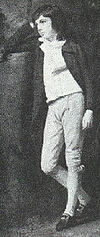
William Courtenay, 9th Earl of Devon
Encyclopedia

William Courtenay, 8th Earl of Devon
William Courtenay, 8th Earl de jure of Devon was the eldest son of William Courtenay 7th de jure Earl of Devon, and Lady Frances Finch....
, (de jure
De jure
De jure is an expression that means "concerning law", as contrasted with de facto, which means "concerning fact".De jure = 'Legally', De facto = 'In fact'....
8th Earl of Devon
Earl of Devon
The title of Earl of Devon was created several times in the Peerage of England, and was possessed first by the de Redvers family, and later by the Courtenays...
) 2nd Viscount Courtenay and his wife Frances Clack. He was baptized on 30 August 1768.
Courtney's siblings consisted of thirteen sisters. Born fourth among his parent's children, William Courtenay was better known as "Kitty" Courtenay to family and friends. William Courtenay inherited the title of 3rd Viscount Courtenay of Powderham. Furthermore, he also retrospectively revived the title of Earl of Devon
Earl of Devon
The title of Earl of Devon was created several times in the Peerage of England, and was possessed first by the de Redvers family, and later by the Courtenays...
in 1831 for the Courtenay family, the title having been dormant since 1556.
With his new title, he led an excessively flamboyant lifestyle. He was responsible for the addition of a new Music Room at Powderham Castle
Powderham Castle
Powderham Castle is located south of Exeter, Devon, England. The Powderham Estate, in which it is set, runs down to the western shores of the estuary of the River Exe between the villages of Kenton and Starcross....
, designed by James Wyatt
James Wyatt
James Wyatt RA , was an English architect, a rival of Robert Adam in the neoclassical style, who far outdid Adam in his work in the neo-Gothic style.-Early classical career:...
, which included a carpet made by the newly formed Axminster Carpet Company.
Relationship with Beckford
As a youth Courtenay was sometimes named by contemporaries to be the most beautiful boy in England. Courtenay was homosexual and became infamous for his affair with art collector William BeckfordWilliam Thomas Beckford
William Thomas Beckford , usually known as William Beckford, was an English novelist, a profligate and consummately knowledgeable art collector and patron of works of decorative art, a critic, travel writer and sometime politician, reputed to be the richest commoner in England...
. In autumn of 1784 there was a argument between Courtenay and Beckford over a note which Courtenay had. There is no record of what the note said, but a houseguest who happened to be present said that Beckford's response to reading it was that he entered Courtenay's room and "horsewhipped him, which created a noise, and the door being opened, Courtenay was discovered in his shirt, and Beckford in some posture or other - Strange story." Beckford was subsequently hounded out of polite English society when his letters to Courtenay were intercepted by the boy's uncle, Lord Loughborough
Alexander Wedderburn, 1st Earl of Rosslyn
Alexander Wedderburn, 1st Earl of Rosslyn was Lord Chancellor of Great Britain from 1793 to 1801.-Life:He was the eldest son of Peter Wedderburn , and was born in East Lothian....
, who then advertised the affair in the newspapers.
He lived in the United States
United States
The United States of America is a federal constitutional republic comprising fifty states and a federal district...
where he owned a property on the Hudson River
Hudson River
The Hudson is a river that flows from north to south through eastern New York. The highest official source is at Lake Tear of the Clouds, on the slopes of Mount Marcy in the Adirondack Mountains. The river itself officially begins in Henderson Lake in Newcomb, New York...
in New York
New York
New York is a state in the Northeastern region of the United States. It is the nation's third most populous state. New York is bordered by New Jersey and Pennsylvania to the south, and by Connecticut, Massachusetts and Vermont to the east...
, and later in Paris
Paris
Paris is the capital and largest city in France, situated on the river Seine, in northern France, at the heart of the Île-de-France region...
. He did not marry due to his sexual orientation, and thus fathered no known children.
He died on 26 May 1835 at age 66 in Paris, France due to natural causes. He was loved by his tenants, who insisted that he be buried in stately fashion. He was buried on 12 June 1835 in Powderham
Powderham Castle
Powderham Castle is located south of Exeter, Devon, England. The Powderham Estate, in which it is set, runs down to the western shores of the estuary of the River Exe between the villages of Kenton and Starcross....
.

